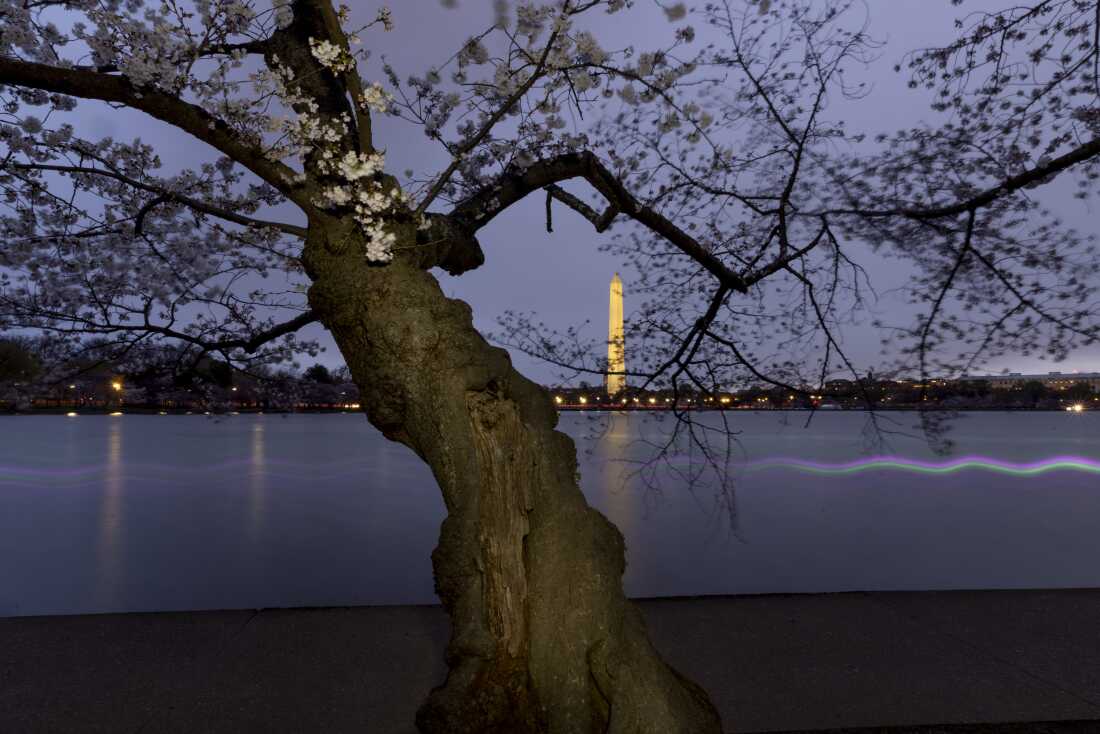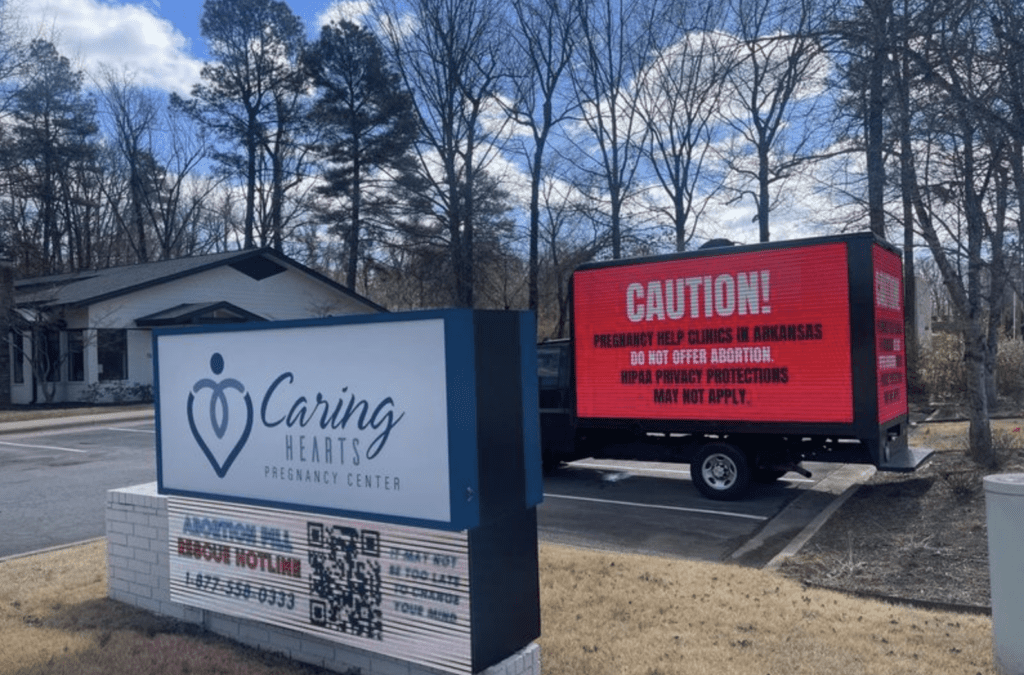
With Higher Ed Attacks, Trump Is Following Orbán’s Playbook
March 27, 2025
In need of some peace? Take a stroll — or scroll — through D.C.’s cherry blossoms
March 27, 2025Over the course of a week in early March, five antiabortion pregnancy clinics in Arkansas had an eye-catching visitor: a huge mobile billboard, in Handmaid’s Tale-red, reading:
CAUTION!
Pregnancy Help Clinics in Arkansas DO NOT OFFER ABORTION.
HIPAA PRIVACY PROTECTIONS MAY NOT APPLY.
The first-of-its-kind digital billboard tour was the brainchild of Mayday Health—which the Arkansas Times dubbed “a zero-fucks-given nonprofit”—whose mission is to share information on how to access safe abortion pills and gender-affirming care, and empower people to make their own informed decision about their own bodies.
“There are about 43 to 45 crisis pregnancy centers in Arkansas … a state where abortion is almost completely banned except in a situation to save the life of the patient,” said Mayday executive director, Liv Raisner. “This leaves every person of childbearing age in a really tough spot if they’re pregnant and don’t want to be because, not only does their state law prevent them from making the choice that can be best for themselves and their family and their financial situation, but they’re also met with deceptive advertising from dozens of CPCs across the state.”
The unregulated crisis pregnancy clinic (UPC or CPC) industry includes an estimated 2,500-4,000 sites operating in all 50 states. UPCs intercept women and teens seeking reproductive healthcare using deceptive advertising, medical disinformation and claims to provide free medical services. But UPCs are not regulated medical businesses. They claim to offer medical care but operate free of the health, safety and licensing standards that govern medical offices. Most do not have medical professionals on staff or a medical director on site. They collect massive amounts of sensitive information from pregnant people but are not subject to any medical data privacy laws.
“They advertise themselves as pregnancy clinics, but they’re not medical at all,” said Raisner. “They’re not governed by HIPAA. When you walk in there, your privacy isn’t protected. They have a very singular clear mission: Dissuade patients who walk in from getting an abortion at all costs.”
“We’ve been everywhere around the country raising the alarm about these centers,” continued Raisner, “so we went to Arkansas with the same mission as we do in every state, which is just to raise the awareness about these centers so that people don’t get duped into going to a center that is not serving their best interests medically.”

Mayday’s billboard tour spanned the state, stopping at UPCs in the western Arkansas cities of Fort Smith and Russellville, in Jonesboro and Paragould in the northeastern corner of the state, and wrapping up in the capital city of Little Rock, where the truck visited two UPCs positioned right next to reproductive health clinics.
Crisis pregnancy center staff were not pleased. In Fort Smith, Russellville and Jonesboro, staff repeatedly called the police. Each time a patrol car arrived, some with lights and sirens blaring, the billboard driver calmly asserted his legal rights. All encounters were resolved peacefully.
According to Raisner, “Our truck obliged every time, but instead just parked itself about 500 feet either across the street or next door to the clinic so that passersby and visitors to these centers were still able to see this message.”
In Russellville, two police cars chased down the mobile billboard where it had driven several blocks away from the UPC over a baseless “criminal trespassing” claim. No charges were filed.
Mayday tracked the tour on social media:
Arkansas: A Poster State for Taxpayer-Funded UPC Deception
Unregulated pregnancy clinics use disinformation and delay tactics to intercept “abortion-minded” women—tactics which prevent access to timely prenatal care.
Yet UPCs are increasingly the only resource available to pregnant women and teens in many communities, especially in states like Arkansas where abortion is banned and maternal care deserts are increasing.
And these unregulated clinics are increasingly subsidized by taxpayer dollars. Between 2021 and 2024, legislatures in 21 states allocated over half a billion in taxpayer dollars to UPCs, despite being part of a multi-billion-dollar industry that took in 70 percent of the revenue reported by the entire antiabortion movement in 2022.
Arkansas is one of seven states that created new UPC funding programs during this period. State politicians who champion tax funding for UPCs claim that these groups reduce maternal and infant mortality. But, while the UPC funding sponsor called his bill “An Act to Make an Appropriation to Reduce Maternal and Infant Mortality by Making an Appropriation for Pregnancy Help Organization Grants,” he rejected a proposal for state-funded UPCs to track whether their clients go on to access prenatal care. Timely prenatal care is critical to reducing maternal mortality.
Within 24 hours, we had responses and next-step planning calls from almost a dozen states with near or total abortion bans across the country.
Liv Raisner, Mayday executive director
Arkansas has one of the highest maternal mortality rates in the country, at 38.3 deaths per 100,000 live births. (The U.S. average is 23.2.)
In 2024, as Arkansas Gov. Sarah Huckabee Sanders (R) publicly opposed Medicaid expansion to cover postpartum care, the legislature doubled taxpayer funding for UPCs, from $1 million to $2 million. This year the Arkansas legislature is allocating another $2 million to unregulated pregnancy clinics in the state.
According to a statement from Mayday, “Despite the increase in taxpayer dollars going to this industry, there has been no increase in oversight and accountability. UPCs operating in Arkansas and receiving state funds are not subject to the same independent oversight as medical facilities.”
Arkansas taxpayers are also underwriting a purported UPC “telehealth” program operated by the state-funded Arkansas Pregnancy Network (APN). The “myARnurse” website brands as “Free Telehealth for Women” with a “network of Arkansas nurses (that) is committed to helping you take your next steps with 100% free and confidential, no insurance needed, and easy-to-access healthcare.”
There are no nurses or participant credentials listed on the website. A “talk to a nurse” button opens a FaceTime window—indeed, every link on the website appears to do that—which is not a secure or confidential platform. It is unknown whether myARnurse complies with state laws governing telehealth services.
In September 2024, Arkansas Pregnancy Network CEO Christie Robertson promoted myARnurse on a Heartbeat International podcast, “Implementing a Statewide Telehealth Program.” At Heartbeat’s Annual Conference earlier in the year, President Jor-El Godsey told attendees, “As a movement, it is time to aggressively add virtual ministry outreach through telecare and telehealth… to battle the giant that is Big Abortion.” Heartbeat International reports having between 3,265 and 3,700 affiliates members worldwide.
In an exposé published in the Arkansas Times, Gennie Diaz of For AR People called myARnurse “a hotline that disguises itself as a medical resource but provides no actual medical care … a state-funded psychological trap.”
Sharing a friend’s experience calling the myARnurse hotline, Diaz reported, “Every response was met with the same insistence: Before my friend did anything else, she needed to visit one of their pregnancy centers. … The nurse kept ignoring her autonomy, steering her away from any licensed medical provider and toward their clinics instead.”
Speaking on the Heartbeat International podcast, APN’s Robertson shared that her group was spending $500 per day in Google ads to promote myARnurse in Arkansas. Gennie Diaz reported that, when someone searches for abortion in Arkansas, “myARnurse is the first site Google generates.”
Diaz said Christie Robertson is a former UPC director and “longtime anti-abortion activist…working alongside powerful anti-abortion legislators to funnel money into these (CPC) operations.” Diaz also reveals that Robertson and other members of the state-funded UPC network were “key players” in the effort to defeat the Arkansas Abortion Amendment in 2024, “coordinating church groups to monitor canvassers and deter voters from signing the petition.”
“They are not just lobbying against abortion; they are actively eroding the right of Arkansans to vote on their own reproductive choices,” Diaz wrote. “We’ll say it again, this group is state funded.”
New Calls for UPC Transparency and Accountability in Arkansas
Mayday’s mobile billboard tour is one of a number of actions this year bringing new scrutiny to unregulated pregnancy clinics in Arkansas.
In January, the Electronic Frontier Foundation (EFF) sent a letter to the state’s Attorney General Tim Griffin calling for an investigation of deceptive privacy practices by UPCs in his state, to determine whether they are “violating privacy and consumer protection laws by deceiving clients as to how their private information will be retained and used.”
EFF, a nonprofit civil liberties organization that works to protect free speech and privacy rights in the online world, cited multiple Arkansas UPCs that misleadingly claim to be HIPAA-compliant or HIPAA-covered entities, including 1st Choice Pregnancy Medical Center in Fort Smith, ChoiceCare in Russellville, and Options on Main in Paragould—all of which had visits from Mayday’s mobile billboard in March.
EFF’s letter to the Arkansas AG cited watchdog complaints last year about similar CPC practices in five other states, suggesting a possible industry-wide practice. The vast majority of UPCs are affiliated with one or more of three national anti-abortion advocacy organizations, Heartbeat International, Care Net and National Institute of Family and Life Advocates (NIFLA), which provide affiliates with training, marketing, web content, client data platforms, ultrasound equipment, funding, legal strategy and representation and more.
EFF also alerted AG Griffin to a massive UPC client data breach that happened in his neighboring state of Louisiana last year when Heartbeat International exposed the names, addresses and private health information of UPC clients to the public. EFF noted that “some CPCs may be sharing client information with other centers in their affiliated networks, without appropriate privacy or anonymity protections.”
And Arkansas advocates are demanding action. For AR People is calling for an investigation into how state funds are being used to interfere with private medical decisions, and urging Arkansans to call their representatives to demand an end to state funding for crisis pregnancy centers. Gennie Diaz writes: “It’s time to defund deception.”
Mayday Mobile Billboards Headed to More States
The Arkansas UPC billboard tour was met with enthusiastic support from reproductive health advocates and providers in Little Rock. Journalists from the Arkansas Times, Arkansas Advocate and Arkansas Democrat-Gazette covered the event.
Mayday’s Raisner said the response from other states has been overwhelming. “We broadcast this action on our own social media pages then we issued a call to action and asked people, ‘Where do you want to see us next? Where do you want these trucks?’ And within 24 hours, we had responses and next-step planning calls from almost a dozen states with near or total abortion bans across the country.”
Raiser said the response was so inspiring, it changed Mayday’s strategy, at least for the next year. “We want to be in every single state where abortion is banned, raising awareness about these centers, whether it’s through digital billboard trucks, wheat pasting, skywriting, flying airplanes with banners at high traffic volume events. The response we’ve seen… just demonstrates how much outrage there is that these clinics exist and how much appetite there is to fight back against them. We are really heartened to see how galvanized and invigorated people are.”
Great Job Jenifer McKenna & the Team @ Ms. Magazine Source link for sharing this story.






